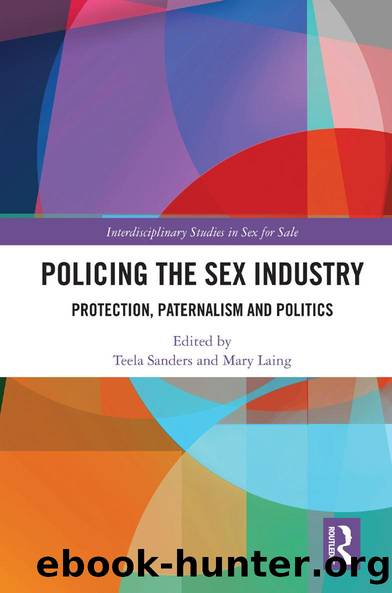Policing the Sex Industry by Teela Sanders Mary Laing

Author:Teela Sanders, Mary Laing [Teela Sanders, Mary Laing]
Language: eng
Format: epub
ISBN: 9780367375140
Barnesnoble:
Publisher: Taylor & Francis
Published: 2019-07-12T00:00:00+00:00
1Under the Prostitution Reform Act, every operator of a sex work business must obtain an operatorâs certificate
5ââNot in our nameâ
Findings from Wales supporting the decriminalisation of sex work
Tracey Sagar and Debbie Jones
Introduction
Several countries across the globe have English law at the very foundation of their legal systems (Australia, Canada and New Zealand for example), thus it is hardly surprising that in line with the English law, âprostitutionâ has been closely associated with a public nuisance discourse in so many countries, with a tradition of managing and containing âvisibleâ street-based sex work in particular (Hancock 1991; Kantola and Squires 2004; Scoular 2010; Abel et al. 2010; Campbell 2015). However, unlike parts of Australia and New Zealand which have adopted a progressive approach to sex work through either licencing (Australia) or the removal of sex work laws (New Zealand), England and Wales (like Canada) have remained steadfast in their position that visible sex work is offensive, injurious and a self evident public nuisance, thus commanding criminal law sanctions (Wolfenden 1957). In England and Wales a system of partial criminalisation seeks to âmanageâ sex work through outlawing a variety of visible activities such as soliciting and loitering in a public place under the Street Offences Act 1959 and kerb crawling and soliciting under the Sexual Offences Act 1985. It is an approach that was re-emphasised in the late 1990s and beyond under the then New Labour government where sex work was not only held up as a public nuisance but also took on the mantle of behaviour that was anti-social causing harassment, alarm and distress to members of the wider community (Crime and Disorder Act 1998). Under the New Labour government communities were urged not to tolerate prostitution; the government even supported community activism against sex workers through the state backed âStreet Watchâ community/policing initiative which had a primary aim of displacing sex workers outside of the community, and it urged local authorities and the police to work with members of the community to curb undesirable behaviour through the implementation of anti-social behaviour orders (ASBOs) preventing sex workers from engaging in âprostitutionâ and excluding them from entering specified geographical areas (Sagar 2005, 2007). All of this took place within a new era of policing underpinned by the concept of community safety.
Somewhat ironically, conceptually community safety moved the focus of crime prevention from property to people â it re-focused attention to the safety needs of those in the community (Squires 1997). Achieving community safety was dependent on local people working with the police and other agencies to undertake coordinated action to resolve local problems. For the police, this partnership approach shared accountability for local issues but in doing so it meant that problems requiring community/police action were also selected at the local level, and primarily this meant that they would be set by the respectable middle classes i.e. those who were much more likely to engage with the police (Brake and Hale 1992: 77, cited in Squires 1997) to the detriment of others. Focusing
Download
This site does not store any files on its server. We only index and link to content provided by other sites. Please contact the content providers to delete copyright contents if any and email us, we'll remove relevant links or contents immediately.
Zero to IPO: Over $1 Trillion of Actionable Advice from the World's Most Successful Entrepreneurs by Frederic Kerrest(4569)
Machine Learning at Scale with H2O by Gregory Keys | David Whiting(4313)
Never by Ken Follett(3957)
Harry Potter and the Goblet Of Fire by J.K. Rowling(3857)
Ogilvy on Advertising by David Ogilvy(3622)
Shadow of Night by Deborah Harkness(3368)
The Man Who Died Twice by Richard Osman(3078)
Book of Life by Deborah Harkness(2939)
The Tipping Point by Malcolm Gladwell(2922)
Will by Will Smith(2919)
Purple Hibiscus by Chimamanda Ngozi Adichie(2853)
0041152001443424520 .pdf by Unknown(2845)
My Brilliant Friend by Elena Ferrante(2831)
How Proust Can Change Your Life by Alain De Botton(2814)
How to Pay Zero Taxes, 2018 by Jeff A. Schnepper(2655)
Hooked: A Dark, Contemporary Romance (Never After Series) by Emily McIntire(2554)
Rationality by Steven Pinker(2363)
Can't Hurt Me: Master Your Mind and Defy the Odds - Clean Edition by David Goggins(2341)
Borders by unknow(2313)
